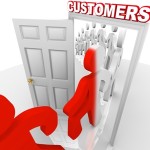 Converting qualified website visitors into leads is one of the biggest tasks marketers face. Inbound marketers, however, have to do more. To convert these visitors, inbound marketers have the responsibility of providing content that would convince them to voluntarily hand over to you their contact details. When that happens, they essentially turn from random visitors to leads and hopefully and eventually, customers.
Converting qualified website visitors into leads is one of the biggest tasks marketers face. Inbound marketers, however, have to do more. To convert these visitors, inbound marketers have the responsibility of providing content that would convince them to voluntarily hand over to you their contact details. When that happens, they essentially turn from random visitors to leads and hopefully and eventually, customers.
Then again, how does an inbound marketer optimise his/her conversions? The answer lies in creating the right conversion paths.

 Lately we have been taking not a few clients who had previous SEO companies that engaged in techniques that hurt the client website’s rankings. So I thought today I’ll share a little bit about how to recover from bad links and get the Google penalty removed from your site.
Lately we have been taking not a few clients who had previous SEO companies that engaged in techniques that hurt the client website’s rankings. So I thought today I’ll share a little bit about how to recover from bad links and get the Google penalty removed from your site. With millions of active blogs on the Internet and growing, it’s getting tougher and tougher for bloggers to get much-needed attention and traffic. Worse, it’s getting more difficult to land on the first pages of the major search engine. Still, every blogger worth his salt has to continue figuring out how best to top search results, social media and other areas of the web as it stands today. To help you make your blog dominate in marketing in 2014, here are a few tips that could be instrumental to your blog’s success.
With millions of active blogs on the Internet and growing, it’s getting tougher and tougher for bloggers to get much-needed attention and traffic. Worse, it’s getting more difficult to land on the first pages of the major search engine. Still, every blogger worth his salt has to continue figuring out how best to top search results, social media and other areas of the web as it stands today. To help you make your blog dominate in marketing in 2014, here are a few tips that could be instrumental to your blog’s success. When going into business, it helps if you’re armed with enough knowledge of the workings of that particular business you’re about to embark on. Consequently, you need to have a working knowledge of the jargon in that field if you want to run your business more efficiently and smoothly. If your business is a web-based one, for instance, you are in for a world of techspeak. For starters, here are 11 web terms every business owner should understand.
When going into business, it helps if you’re armed with enough knowledge of the workings of that particular business you’re about to embark on. Consequently, you need to have a working knowledge of the jargon in that field if you want to run your business more efficiently and smoothly. If your business is a web-based one, for instance, you are in for a world of techspeak. For starters, here are 11 web terms every business owner should understand. So, after constant nagging from people like us online, you’ve finally decided to start a blog for your business, and that is really great. Still, it would be a lot greater if people actually read your blog. Much to your dismay, few netizens are even aware that your company has a blog.
So, after constant nagging from people like us online, you’ve finally decided to start a blog for your business, and that is really great. Still, it would be a lot greater if people actually read your blog. Much to your dismay, few netizens are even aware that your company has a blog. Of all the pages in your website, your About Page serves as your ID, so to speak. It is, after all the page where you are supposed to summarise your business’ history, values, capabilities and its personality.
Of all the pages in your website, your About Page serves as your ID, so to speak. It is, after all the page where you are supposed to summarise your business’ history, values, capabilities and its personality. Next to your website home page, your landing page is the most important part of the entire online business marketing process. As the name implies, your landing page is where users, well, land from an external website. Whatever you have to offer, the user will see it on the landing page and from there make the decision to explore your site further and maybe become one of your customers.
Next to your website home page, your landing page is the most important part of the entire online business marketing process. As the name implies, your landing page is where users, well, land from an external website. Whatever you have to offer, the user will see it on the landing page and from there make the decision to explore your site further and maybe become one of your customers. Every page on your website is important, but nothing tops the importance of your website home page. If your site were an actual brick-and-mortar shop, the website home page would be its reception area. It is where customers first gather, and what they see there will become a huge factor in their decision to stay on the site, or leave it.
Every page on your website is important, but nothing tops the importance of your website home page. If your site were an actual brick-and-mortar shop, the website home page would be its reception area. It is where customers first gather, and what they see there will become a huge factor in their decision to stay on the site, or leave it. It can never be stated enough that in this Internet-driven world, every single business should have its own blog. There are numerous reasons for this, but perhaps the most important thing is that a company blog serves as a simple, easy-to-use platform for connecting with and providing relevant, timely and helpful information for customers.
It can never be stated enough that in this Internet-driven world, every single business should have its own blog. There are numerous reasons for this, but perhaps the most important thing is that a company blog serves as a simple, easy-to-use platform for connecting with and providing relevant, timely and helpful information for customers. For people who make Google Plus an integral part of their Internet marketing strategy, it could get incredibly frustrating to have posts that get very little response compared to posts from other Google+ pages, which seem to have no problem getting tons of +1s and comments on any given post.
For people who make Google Plus an integral part of their Internet marketing strategy, it could get incredibly frustrating to have posts that get very little response compared to posts from other Google+ pages, which seem to have no problem getting tons of +1s and comments on any given post.